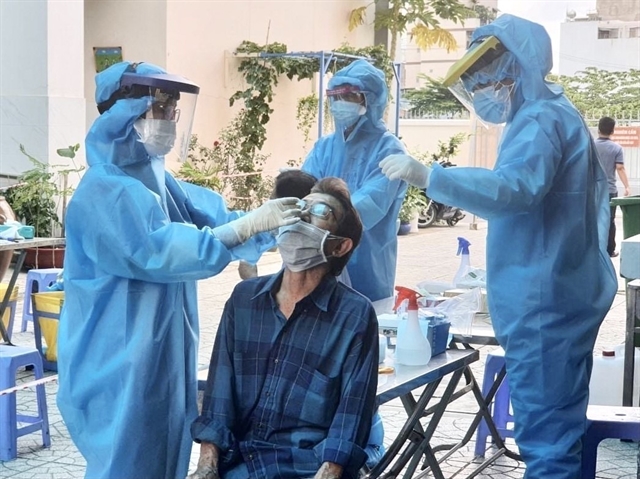 Society
Society


|
| Medical students in HCM City take samples from residents in District 8 for COVID-19 tests. — VNA/VNS Photo Hồng Giang |
HCM CITY — HCM City is using IT solutions to supervise COVID-19 patients' close contacts (called F1) who are in isolation at home.
The city Department of Information and Communications is working with the Department of Health and the Centre for Diseases Control and Prevention to pilot the Vietnam Health Declaration system to manage close contacts of COVID-19 patients.
The Vietnam Health Declaration (VHD) system is developed by the Viettel Business Solutions Corporation, a Viettel Group member.
F1 cases in isolation at home download a VHD application from the App Store or Google Play. They are required to fill online health declaration forms three times each day, including 8am-12am, 2pm-4pm, and 6pm-8pm.
If they fill online health declaration forms outside the registration address of quarantine, the app will issue a warning and ask them to go back to their home address.
The warning will also be sent to health officials and authorities in charge of managing them. After receiving the warning, health officials or authorities will go the house of the F1 to check.
If the F1 cases do not have a smartphone, health officials and authorities will regularly check their house.
The Department of Information and Communications is strengthening communications about quarantine procedures in newspapers and social media. People in the city can call the number 1022 to ask for information about the quarantine system.
The city Department of Information and Communications has also proposed using smart watches.
Smart watch
A smart watch developed by TMA Innovation Company under collaboration with Quang Trung Software City acts as a home quarantine control devices. The built-in GPS identifies the quarantined person’s location in real time and records violations.
It has a temperature sensor that reports to the management system, and helps replace health workers required for daily temperature checks, thus reducing the risk of infection. It also checks blood pressure, blood oxygen and heart rates.
Authorities can create a profile and provide wearables to the quarantined person, set up alerts when they leave the quarantine area or have a high fever, and retrieve their travel history and temperature information.
Data transmitted from the device is controlled and can only be retrieved by authorised parties.
The city Computer Association said that free 1,000 smart devices for F1 cases would be distributed.
Home quarantine
In order to reduce overcrowding at hospitals and concentrated quarantine facilities, HCM City is also piloting the quarantine of COVID-19 patients (F0) who have no symptoms, as well as close contacts who have worn masks near COVID patients and have tested negative.
Health workers who have tested positive for coronavirus but have no symptoms are also being isolated and treated at their home. They will monitor their health and report to local health centres every day. They will also be tested under the department’s protocol and will be required to ensure safety and prevent transmission to others in their family.
COVID-19 patients being treated at hospitals but have no symptoms will be discharged 10 days after admission when two consecutive COVID-19 tests (RT-PCR tests taken 24 hours or more apart) return negative or show a low viral load.
When they return home, they will also need to self-isolate and monitor their health status at home for another 14 days.
Newly diagnosed COVID-19 patients with no symptoms and a low viral load will be brought to health facilities for temporary isolation and monitoring. After 24 hours, if tests show that the viral load is still low or the second test is negative, they will go home and isolate.
F1 cases who are isolating at home are defined as close contacts who were wearing masks during contact with COVID patients, and who have tested negative.
This F1 category includes people who have had contact with COVID-19 patients, but not regularly; those who have worked with COVID-19 patients but sat two metres from them; and those who were taking care of people aged more than 60, children, pregnant women, or people with disabilities.
People who have stayed in quarantine facilities for 14 days and have tested negative for coronavirus on the 14th date of quarantine will continue their quarantine at home for 14 more days. Previously, these people had to stay in quarantine facilities for 21 days.
F1 cases have to stay in a separate room at home and not eat with family members. The isolation room should be cleaned and disinfected every day. If all members of families are close contacts of a COVID patient, they do not need a separate room to isolate each family member. — VNS




